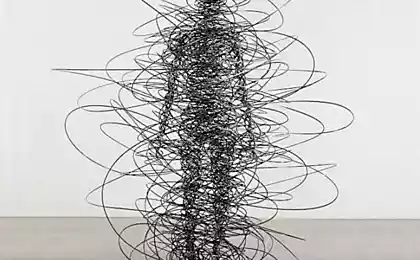496
Loneliness worse than pain—psychological experiment
Not to be left alone, people willing to subject themselves to electroshock.
We used the lion's share of their time buried in the screen of the mobile phone, smartphone, tablet and the list goes on, although not always aware of their own addiction to the latest gadgets. We can assume that all the matter, on the one hand, in our exclusive curiosity, desire to constantly learn something new, and on the other hand, the exceptional convenience of modern electronics. But, as suggested by psychologists from the University of Virginia, the case here is different. Namely the fact that there is no man nothing worse than to be alone.

The experiment that put Timothy Wilson (Timothy Wilson) together with his colleagues, was quite simple: psychologists asked volunteers to be alone in an empty room without a phone and without the ability to read or write. That is, the experiment was more than a simple lack of communication – you can call it a stagnant solitude. Alone with my thoughts people remained from 6 to 15 minutes, after which he was asked if he liked it or not liked it, and if he could concentrate in such a situation.
The first series of experiments were conducted with the students, and most of them loneliness did not like – in the words of participants, to concentrate on something was difficult, thoughts wandered uncontrollably. But if people could have something to do (e.g., listening to music or reading), then this pastime immediately made pleasant, and focus was easier. The same thing happened when the experiment was set in a laboratory room, and home environment did not help to concentrate if the person wasn't doing anything.
But, perhaps, it's all about age. Maybe a relatively young brain needs constant stimuli, if not in the form of communication, at least in the form of a hearing-citania? The experiments were repeated with different ages of volunteers, and found that to be alone is quite difficult for a variety of people ranging in age from 18 to 77 years with different education, social status, etc. That is, even very elderly people have experienced discomfort when they were asked just to sit and think. This is strongly at odds with generally accepted notions of what old people almost all the time deep in thought.
But the most surprising came to light when psychologists tried to assess the extent to which people do not like to stay in a stagnant solitude. The participants of the experiment said that they will be able to get rid of an uncomfortable situation, if you hit yourself with the current – not much, but unpleasant. People gave advance to feel what they feel, so when given the choice, they were fully aware of what is coming. So, as the authors work in Science, most of the volunteers willingly agreed to an unpleasant shock, but would again not be alone. Moreover men agreed on the pain more often than women: if men chose electric shocks, two-thirds, among the women only the fourth part. This, of course, possible to explain the greater "virility" of the stronger sex, but the researchers believe that men are more dependent on the feeling that they are worse than women, tolerate the absence of external stimuli.
The point here is, obviously, not so much in the present, not "digital noise" and not in gadgets, and in the General aspect of the human psyche, that separation from the world was and is not too pleasant for us. You may recall the monastic and solitary exploits that remained in the history, obviously, not least due to the fact that people couldn't grasp – how is it possible so much time in their own reflection? The current age just provided new tools that help us not to be alone.
Of course, you can think about meditation and other spiritual practices that require solitude. However, in this case psychologists working with the average phenomenon and meditations do still not very many. On the other hand, let's not forget that in this work people are forced to be alone – it is possible that when such a situation happens by itself, for the domestic needs of the people any discomfort experienced and can easily focus on your thoughts.
It would also be interesting to know what processes in the brain accompany a feeling of discomfort when inactive alone, and how these processes are different in men and women. However, there will need to have other neurobiological experiments.
Source: nkj.ru
We used the lion's share of their time buried in the screen of the mobile phone, smartphone, tablet and the list goes on, although not always aware of their own addiction to the latest gadgets. We can assume that all the matter, on the one hand, in our exclusive curiosity, desire to constantly learn something new, and on the other hand, the exceptional convenience of modern electronics. But, as suggested by psychologists from the University of Virginia, the case here is different. Namely the fact that there is no man nothing worse than to be alone.

The experiment that put Timothy Wilson (Timothy Wilson) together with his colleagues, was quite simple: psychologists asked volunteers to be alone in an empty room without a phone and without the ability to read or write. That is, the experiment was more than a simple lack of communication – you can call it a stagnant solitude. Alone with my thoughts people remained from 6 to 15 minutes, after which he was asked if he liked it or not liked it, and if he could concentrate in such a situation.
The first series of experiments were conducted with the students, and most of them loneliness did not like – in the words of participants, to concentrate on something was difficult, thoughts wandered uncontrollably. But if people could have something to do (e.g., listening to music or reading), then this pastime immediately made pleasant, and focus was easier. The same thing happened when the experiment was set in a laboratory room, and home environment did not help to concentrate if the person wasn't doing anything.
But, perhaps, it's all about age. Maybe a relatively young brain needs constant stimuli, if not in the form of communication, at least in the form of a hearing-citania? The experiments were repeated with different ages of volunteers, and found that to be alone is quite difficult for a variety of people ranging in age from 18 to 77 years with different education, social status, etc. That is, even very elderly people have experienced discomfort when they were asked just to sit and think. This is strongly at odds with generally accepted notions of what old people almost all the time deep in thought.
But the most surprising came to light when psychologists tried to assess the extent to which people do not like to stay in a stagnant solitude. The participants of the experiment said that they will be able to get rid of an uncomfortable situation, if you hit yourself with the current – not much, but unpleasant. People gave advance to feel what they feel, so when given the choice, they were fully aware of what is coming. So, as the authors work in Science, most of the volunteers willingly agreed to an unpleasant shock, but would again not be alone. Moreover men agreed on the pain more often than women: if men chose electric shocks, two-thirds, among the women only the fourth part. This, of course, possible to explain the greater "virility" of the stronger sex, but the researchers believe that men are more dependent on the feeling that they are worse than women, tolerate the absence of external stimuli.
The point here is, obviously, not so much in the present, not "digital noise" and not in gadgets, and in the General aspect of the human psyche, that separation from the world was and is not too pleasant for us. You may recall the monastic and solitary exploits that remained in the history, obviously, not least due to the fact that people couldn't grasp – how is it possible so much time in their own reflection? The current age just provided new tools that help us not to be alone.
Of course, you can think about meditation and other spiritual practices that require solitude. However, in this case psychologists working with the average phenomenon and meditations do still not very many. On the other hand, let's not forget that in this work people are forced to be alone – it is possible that when such a situation happens by itself, for the domestic needs of the people any discomfort experienced and can easily focus on your thoughts.
It would also be interesting to know what processes in the brain accompany a feeling of discomfort when inactive alone, and how these processes are different in men and women. However, there will need to have other neurobiological experiments.
Source: nkj.ru
























